In 2011, I left Seattle with just $200 in my pocket to travel the world solo. Today, I'm the founder and creator of The Solo Girl’s Travel Guide, the #1 travel guide book series for women - and the author of The One-Way Ticket Plan.
Meet Alexa
this book has magic powers
The Best Selling Travel Guide Book Series for Women
Join my weekly newsletter - Solo Girls Stories - and learn to travel smarter via my wild mistakes.
Travel Cheaper, Smarter, Safer, and Longer.
A Complete Guide to Teach English in South Korea (Everything You Need to Know)
Table of Contents

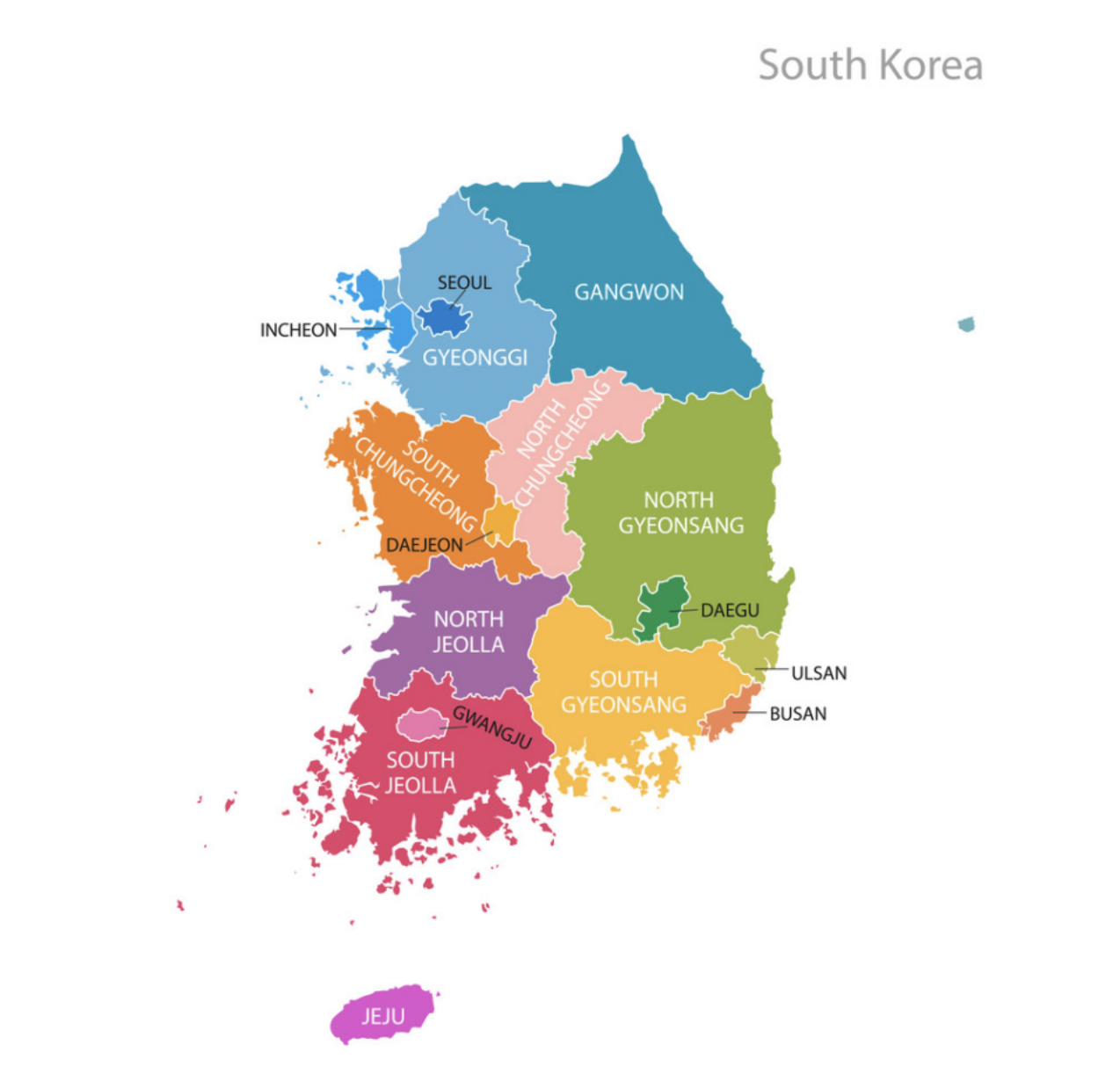
YOU WANT TO TEACH ENGLISH IN SOUTH KOREA ?
Read this guide first! This is your shortcut to finding a job, applying for your visa and moving to South Korea! And what to expect in terms of the teacher lifestyle in South Korea. Hint hint: It looks like this…lots of love.
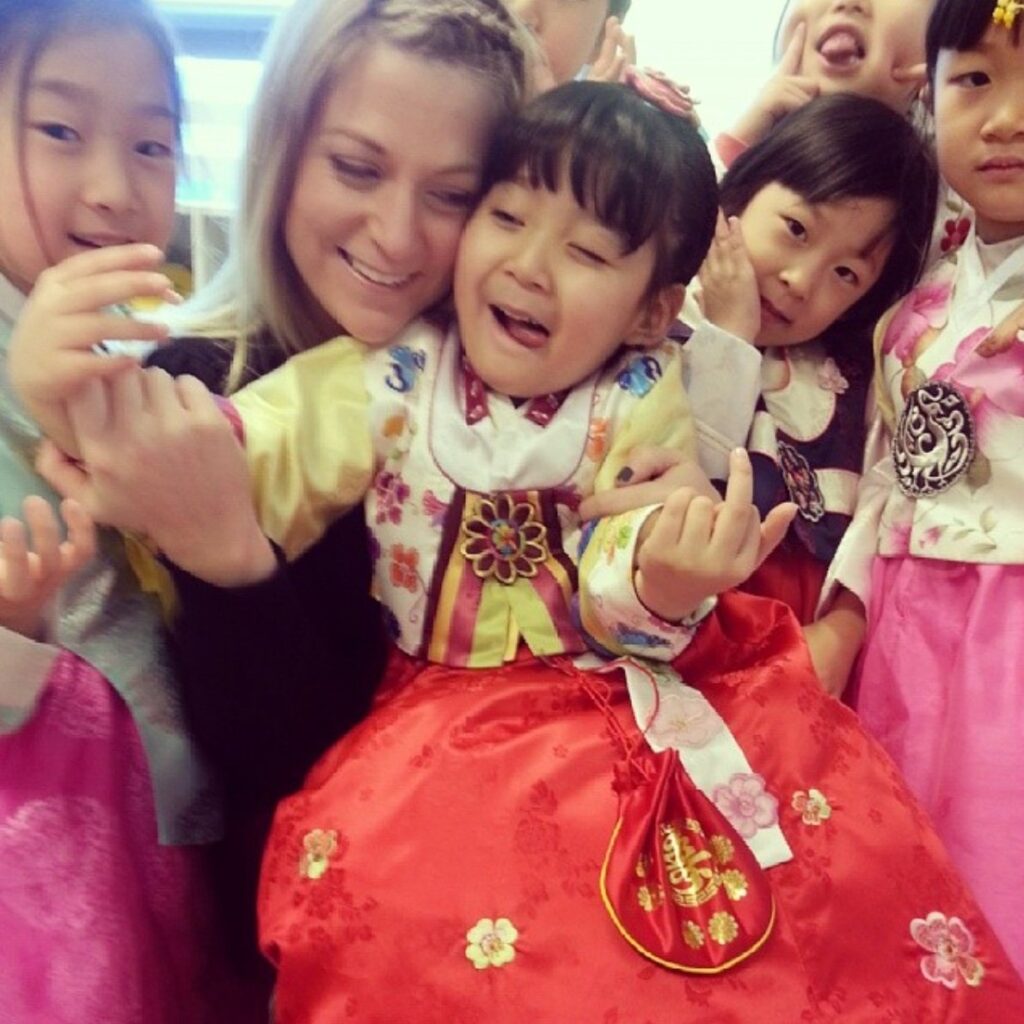
How do you choose where to teach in South Korea? How do you choose if you want to teach in a public school or a private school? How do you apply and find jobs in South Korea? You and to be sure that you don’t get stuck at a bad school in a crappy town getting paid low wages (those jobs exist!) otherwise it’s going to be a long and miserable year. You want the best teaching jobs in South Korea at the best schools with a boss and fellow teachers that support you! You also want to make sure that you’re getting paid fairly and are working hours that match your pay!
Take note from me. I was an ESL English Teacher in Korea for two years in two different cities at two different schools and my experiences were two very different realities.
My second school (photo below) was much more relaxed for both me and the children. Our school environment was serene and the curriculum was such high-quality. I get teary just thinking about it.

Whereas the first school I taught in was exhausting for both the teachers and the students. Not all schools are created equal!
In this guide, I am going to teach you how to choose your school (and city in Korea), how to get a job, and how to prepare and pack for moving to South Korea.
By the end of this guide, you’ll be ready to move to South Korea!
WHY TEACH ENGLISH IN SOUTH KOREA?

The answer is simple: Money!
And an amazing adventure. But money.
The opportunity to make money, to save money and to collect things (like rent and transportation) instead of spending money!
South Korea offers one of the most lucrative teaching locations for ESL teachers in the world. Many teachers come here out of college looking for a way to pay off student loans, some want to save, and some want to have extra money to travel!
With your flights, housing, and medical insurance paid for by your schools, nearly every penny you make is a penny you keep. The quality of life over here is great. Workweeks average around 35 hours per week, you have an excess of income, you never worry about being able to pay your bills, there are extremely social expat communities in every city, the country is extremely safe, South Korea is a travel hub for Asia, you get to experience a new culture every day…we could go on and on.
Did I mention the extra bonus and pension that you walk away with at the end of your contract? That’s an extra $4k or so, on top of that month’s paycheck. When all the benefits and cash add up- it’s a damn good deal.
In short: Life is prosperous and fun in South Korea.
QUALIFICATIONS TO TEACH IN SOUTH KOREA
You either qualify to teach English in South Korea or you don’t. No loopholes or ‘under the table’ shenanigans going on in this country. South Korea is not messing around. If you don’t have the qualifications to teach in Korea, don’t worry…there are more options to teach English in Asia which I’ll eventually link here.
But for now, let’s see what you need to get a teaching job in Korea.

QUALIFICATIONS REQUIRED
- Be a Native English Speaker: Required
- Bachelor’s Degree: Required
- TEFL Certificate, CELTA Degree or Equivalent: If your bachelor’s degree is not in teaching or English, you should have a TEFL Certificate (you can get online).
- Criminal Background Check: Required
- Full Health Check: You must pass a full health check including a medical/drug test when you land in South Korea.
When applying to language schools in competitive cities like Seoul, Busan, and Daegu, you really need a TEFL Certificate to give you that edge.
They are the best online ESL Certification program, hands down.
Don’t have a TEFL Certificate yet? I can fix that for you. Click here to get a 10% discount on your TEFL Certificate.
Sign up for the 120-hour TEFL Certificate, which can be finished as quickly as 4 weeks online. I also opted for the online tutor which helped me finish the course quicker and with less studying.
Why do you need a TEFL Certificate?
Some schools require it.
Some schools choose candidates with a TEFL certificate over candidates without a TEFL certificate.
Having a TEFL will increase your value as a teacher and thus increase your salary.
After (or before) South Korea, having a TEFL will open the doors to landing a teaching job in practically any country in Asia. A TEFL degree is your golden ticket to getting hired in South Korea and beyond.
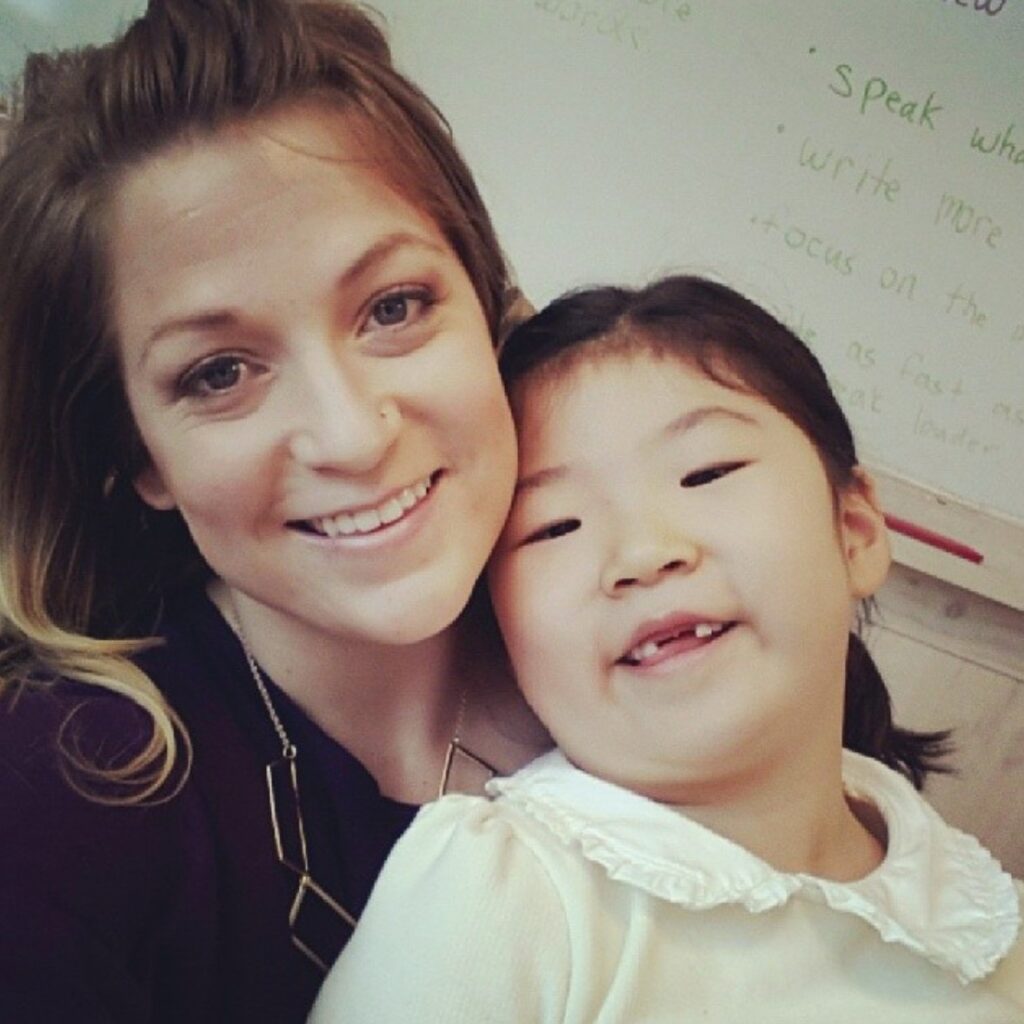
Me, circa 2014, with my favorite student ever, Stella.
Teaching English was healing for me. I loved waking up in the morning and going to class to spend the day with a collection of my mini best friends. I miss those kids all the time.
HOW TO FIND A JOB IN SOUTH KOREA ?
Depending on which kind of school you’re applying for (private or public), you’ve got 3 options when looking for teaching jobs in South Korea….
Option 1: Use a Korean Recruiter for a Private School Job
Korean recruitment agencies work to match potential teachers with Korean kindergartens and English schools that have job openings. They are the official matchmakers between teachers and schools.
Important to Know: You pay nothing for this service; schools pay around $1,000 to the recruiters for successfully matching a teacher- sometimes the paycheck can make recruiters pushy.
Know the Signs of a Good Recruiter: They listen to your preferences and don’t pressure you into working for a school outside those preferences.
➤ HOW TO APPLY WITH A RECRUITER
- Step 1: Go onDave’s ESL Café and search under ‘Korean Job Board”
- Step 2: Scan the job ads to understand the scope of what is offered (do not apply right away – study the job board for 30 minutes before contacting an agent)
- Step 3: Contact a couple of recruitment agencies (they’ll give you their email in the ads) and tell them two things…
A) Which job posting of theirs caught your eye (feel free to copy the title or link of the job posting).
B) Additionally, tell the recruiter your ideal teaching preferences like location, age of students, start date, salary, etc. Build a relationship with a couple recruiters immediately and they’ll help you find what you want.
Here is a script you can copy. Feel free to change the locations or age range.
Hi, my name is ______ and I’m looking for a teaching job in South Korea starting in (March 2022).
I have a Bachelor’s Degree and a TEFL. Here are some things I’m looking for:
Where: Busan, Daegu or a small town near the ocean.
Student Age: Kindergarten or Elementary
Salary: I’m flexible.
I saw your job postings and here are a few positions I like.
xxxxxxx
xxxxxxx
xxxxxxx
Thanks for helping.
Step 4: Your assigned recruiter will reach out to you with a) suggested jobs and b) questions about the status of your documents (see visa section below).
Step 5: Your recruiter will set up Skype, Zoom or phone interviews between you and potential schools
Step 6: If you’re hired, the school will send you a contract to sign. Look over it carefully and don’t be afraid to ask questions!
Step 7: Once you’re hired, send your completed visa documents to your recruiter in South Korea
Step 8: Wait for the green light from your recruiter and apply for your visa at the Korean Embassy in your area. Your recruiter will walk you through all of this!!
Step 9: Fly to South Korea to start teaching!

Option 2: Apply to Language Schools Directly
Already know a school you want to teach at? Or have you found a small Korean language school advertising their own job opening on Dave’s ESL Café without a recruiter? Just message them directly with your resume.
When working with small schools, you’ll still go through the above steps 5-9 all on your own- just be sure to do a little research before you sign anything!
Fun Fact: I taught at Kids College in Daegu and absolutely loved the school, the director and the managers. If you can land a job here, consider yourself lucky. Ps. That’s not me in this video…haha.
Option 3: Apply for a Korean Public School Position Through the EPIK Program
EPIK is the government-run program for English education in Korea. There are two intake periods throughout the year: August and February (when the school sessions start). If you’re applying to teach in South Korea through EPIK, a TEFL will automatically increase your salary
➤ HOW TO APPLY FOR KOREA’S EPIK PROGRAM:
Step 1: Visit EPIK’s Website and click “Application”
Step 2: Download the Application form and fill out your info (basics, education, experience)
Step 3: Submit your application, 2 letters of recommendation, and lesson plan (optional for highly-competitive placement areas)
Step 3: Wait for EPIK to contact you and set up a screening interview
Step 4: Upon passing, collect the necessary visa documents for EPIK and send them to the EPIK headquarters
Step 5: Collect your visa at a Korean Embassy in your area (or have it sent to you).
Step 6: Fly to South Korea to begin Orientation

Andrea. Another one of my favorite students ever.
Teaching kindergarten was so absolutely rewarding as I got to watch little humans’ personalities develop before my eyes.
TEACHING IN PUBLIC SCHOOLS VS. PRIVATE SCHOOLS
EPIK vs Hagwon – Which one is right for you?
Let’s break down the difference…
➤ Public Schools in South Korea (via EPIK)
Benefits
10 weeks vacation time
Will 100% find you a match if you qualify to teach in Korea
Don’t discriminate based on age, gender, race, or appearance
Do discriminate on heavily tattooed teachers and require photos in application
Includes a week-long cultural orientation and intro to living in South Korea
Can apply to teach as a couple
Pitfalls
Fixed salary based on experience/no negotiations
Large class sizes (up to 40 students)
No say in the school or location
Often work with a Korean co-teacher (conflicts are common)
They hire only twice per year
➤ Private Language Schools (called Hagwons)
Benefits
Can negotiate salary
Can choose precisely where you teach
Small class sizes (max 12 students)
Hire year-round
Can apply to teach as a couple
Pitfalls
Only 10 days vacation time
Typically more performances/plays/competitions to please high-paying parents
There can be lots of “desk warming”
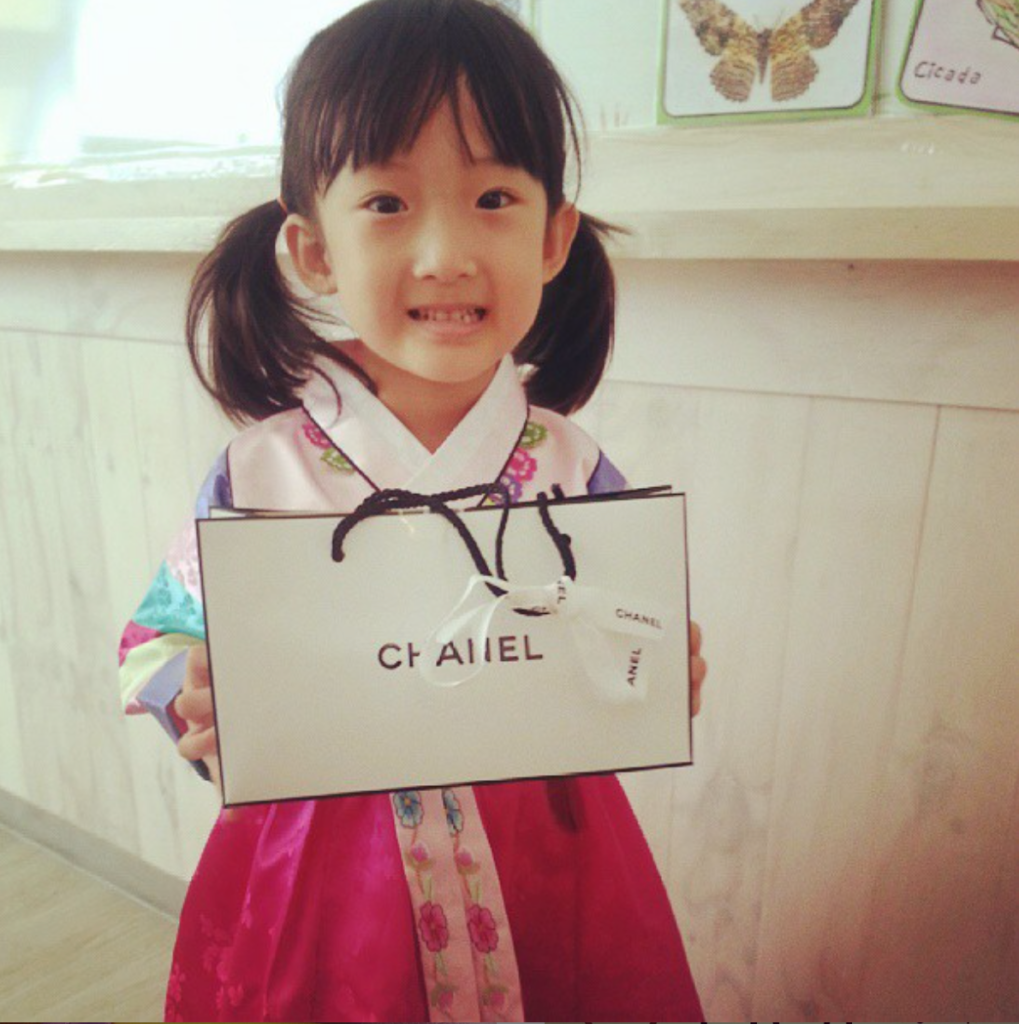
I’m going to be totally honest…
An added benfit of teaching at private schools is the culture of showering your teacher with gifts.
It was not uncommon for me to come into class and have a Starbucks sitting on my desk…sometimes two! And on holidays, like Teachers’ Day, my desk would be filled with Chanel, Prada, and high-end gifts.
It wasn’t WHY I taught in a Hagwon, but it certainly was a luxury I wasn’t used to or I expected. It made teaching a little bit sweeter. Especially when you got an “I’m sorry” box of chocolates from a parent after their child bit you…
WHAT BENEFITS ARE INCLUDED IN A TEACHING JOB IN SOUTH KOREA?
This differs depending on where you’re teaching and in what kind of school. Here is a general breakdown of what to expect.
Benefits of Teaching in Private English Academies
- Average Monthly Income: $1,843-$2,545+ per month
- Housing: Provided
- Flights: Provided
- Medical Insurance: Provided
- 3-Month’s Pay on Your Last Month Teaching: You get 1 pension payout equivalent to 1 month’s salary, 1 end-of-the-year bonus equivalent to 1 month’s salary, and your regular teaching salary. In other words, you walk away with 3-months pay on your last month.
- Vacation Time: 21 vacation days plus national holidays
- Sick Days: Typically 10 sick days with a doctors note
- Contract Commitment: Yearly
- Teaching Hours Per Week: 22
- Downside: You have less of a choice of where you’re placed and your class sizes are usually bigger.
Benefits of Teaching in Public Schools
- Average Monthly Income: $1,843-$2,545+ per month
- Housing: Provided
- Flights: Provided
- Medical Insurance: Provided
- 3-Month’s Pay on Your Last Month Teaching: You get 1 pension payout equivalent to 1 month’s salary, 1 end-of-the-year bonus equivalent to 1 month’s salary, and your regular teaching salary. In other words, you walk away with 3-months pay on your last month.
- Vacation Time: 21 vacation days plus national holidays
- Sick Days: Typically 10 sick days with a doctors note
- Contract Commitment: Yearly
- Teaching Hours Per Week: 22
- Downside: You have less of a choice of where you’re placed and your class sizes are usually bigger.
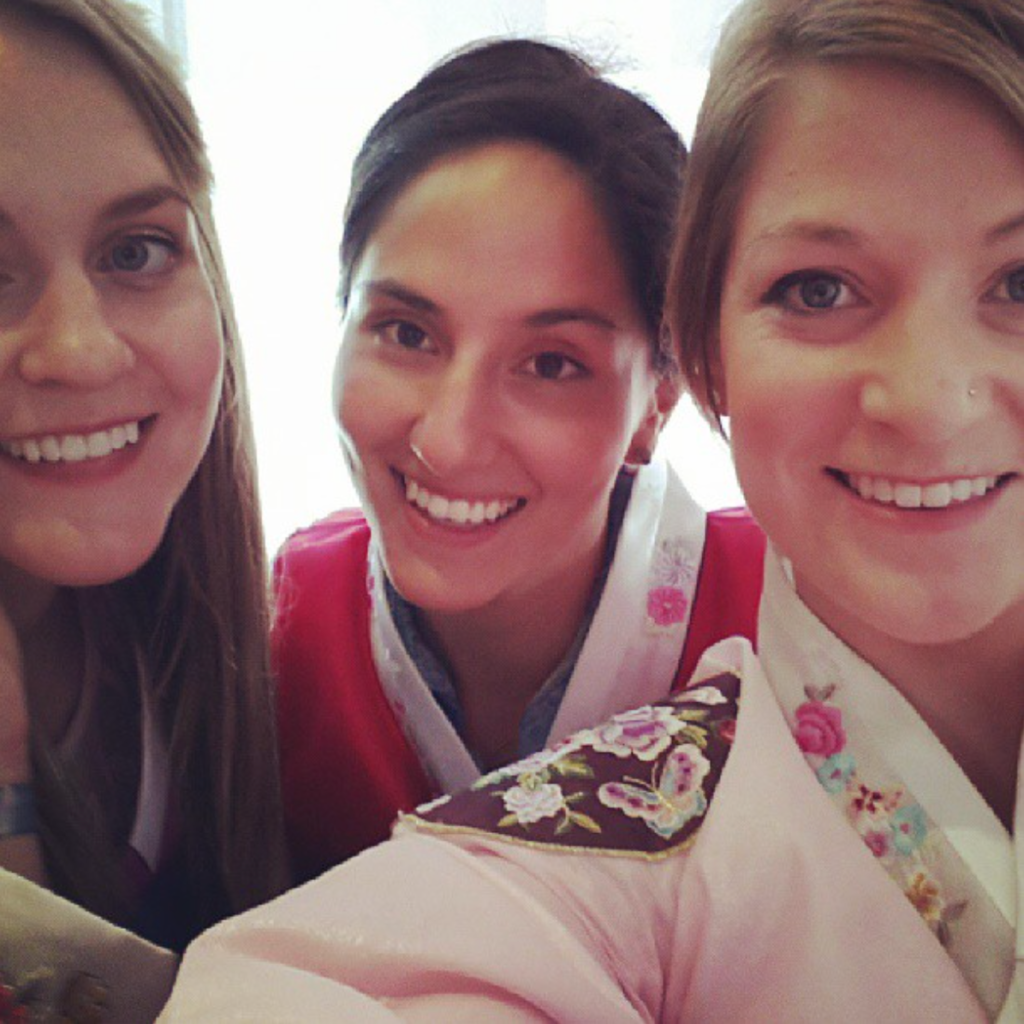
You will make friends no matter which style school you choose.
Many teachers choose EPIK because they think they will have a better chance of meeting people. EPIK does have an initiation week where you meet lots of teachers…
But private schools also come with a built-in social circle. My first school in Busan had 18 teachers! My second school in Daegu had just 8 teachers. Private schools give you the option to decide how social you want to be.
WHAT VISA DO YOU NEED TO TEACH ENGLISH IN SOUTH KOREA?
THE E2 VISA FOR TEACHERS IN
SOUTH KOREATeachers in South Korea work on E2 Visas, sponsored by their school. This visa will allow teachers to live and work in South Korea for 1 year. You will receive this visa BEFORE you fly to South Korea. That means you must first process all of your visa paperwork in your home country (we’ll get to this in the next section).
Because this paperwork can take weeks or even months, to complete, schools want to interview potential teachers who have already started preparing their E2 Visa documents.
I highly suggest that you begin processing your documents even before you start interviewing or writing to recruiters. If you can tell your agent “my documents will be ready by XYZ date”, then a school will be confident to hire you (instead of someone else).
The Korean E2 Visa process goes like
this…- Step 1: Gather your required documents
- Step 2: Send them to your school or recruiter in South Korea
- Step 3: Your school will send you a pin number to access your visa and instructions on how to collect your visa
- Step 4: Send your passport to your nearest South Korean Embassy where they will add the Korean visa stamp in your passport
- Step 5: Wait for your passport to be returned
- Step 6: You’re ready to fly to South Korea
The whole process, from applying for your criminal background check to getting your visa in your passport, can take as little as 6 weeks and as long as 3+ months depending on your method of document collection.
Now, let’s talk about these documents…
➤ DOCUMENTS REQUIRED FOR AN E2
SOUTH KOREAN TEACHING VISANational Background Check with Apostille Stamp
University Degree Photocopy with Apostille Stamp
Your criminal background check must be squeaky clean. You cannot teach in South Korea if you have an arrest record.
THE DOCUMENT COLLECTION
PROCESS IS A PAIN IN THE ASS!(but worth it)
So, I am going to break down what documents you need to get an E2 Teaching Visa for South Korea step-by-step.
(This process is specifically for Americans – other nationalities will have an easier process)
Document 1: FBI Criminal Background
Check with Apostille StampYou need a national (not state) background check with a verified Apostille Stamp (a stamp that says, “hey, this is a real background check and not faked by some terrorist”).
The process of getting your background check used to be long, stupid, stressful and took up to a minimum of 12 weeks. But you can do what I did and use an expedited service!
My favorite FBI Background Chanelling Service, Korvia Consulting to expedite the process. These miracle workers do the heavy lifting for you and keep you from making any mistakes. You’ll pay $50 for a 1-week turn-around (compared to the standard $20 for a 12-week turn-around).
To get started…follow these steps…
Document #1: Your Background Check
- Step 1: Get your fingerprints taken at your local police station today. Do it now by downloading this fingerprint form and printing two copies on regular printer paper or cardstock- both are fine.
- Step 2: Fill out Korvia’s Personal Info Sheet – highlighted sections only.
“Select “Option 1” on your application form and provide an e-mail address for faster FBI result. This service is provided to allow the applicant to retrieve/save/print your individual FBI response.”
- Step 3: Thoughtfully place your 2 completed fingerprint cards, Credit Card Payment Form, and Personal Info Sheet in a manila envelope. Do not bend.
- Step 4: Mail to the following address:
Accurate Biometrics
Attn: Korvia
500 Park Boulevard
Suite 1260
Itasca, IL 60143
- Step 5: Your completed FBI Background Check with Apostille Stamp will arrive in 5-7 Business Days.
On to the next document!
Document #2: Apostille Copy of your University Degree
While you’re waiting for your FBI Background Check with Apostille, get started on Document #2. You need a notary to basically confirm that the degree is real and belongs to you. To do this…
Step 1: Get a copy of your Bachelors Degree and take it to be notarized by a licensed notary (most likely, you can find a notary working in your bank). Go to them with the following:
Your original University Degree
1 photocopy of your University Degree
1 form of photo ID
Type up and print a version of this document
Step 2: Send your Notarized Degree Photocopy to be Apostilled
Each state has 1 official secretary to do this job. You can visit them in person or mail in your document. Consult this list of Secretary of State offices where you can request the Apostille Authentication. Each state is different in terms of price and cost- so call ahead.
This state-level university degree apostille should only take 1 week. When you get your apostilled university degree returned from the state, it will look like this example apostille.
Step 3: Download and Fill Out Additional Forms found here.
Document 3: E2 Medical Check
Document 4: Consulate Questionnaire
Document 5: Visa Application
Final Step: Send Your Documents to Your School in South Korea
Your school will give you instructions on where to send all of your documents. Now you can breathe!
COST OF LIVING IN SOUTH KOREA
Since your school pays for your rent, your cost of living will be relatively low depending on how much you spend on entertainment, travel, and partying. Hard life, right?
In any given city, you can spend $500-$1500 total per month- it all depends on you!
Most teachers are able to save up a nice chunk of change, while teachers with student loans find it very easy to pay off their debt with the salary in South Korea.
Here’s an idea of what to expect to spend while living in Korea…
- Utilities: $139.00
- Taxi (1km): $1.69
- Local Transport 1-way Ticket: $1.10
- 1 Dozen Eggs: $2.90
- Chicken Breast (1kg): $3.49
- Loaf of Fresh White Bread: $2.09
- Draft Beer: $2.63
- Restaurant Meal (average restaurant): $6.14
- McDonald’s Combo Meal: $5.26
- Cinema- International Release (Ticket): $8.76
- Gym Membership: $55.27
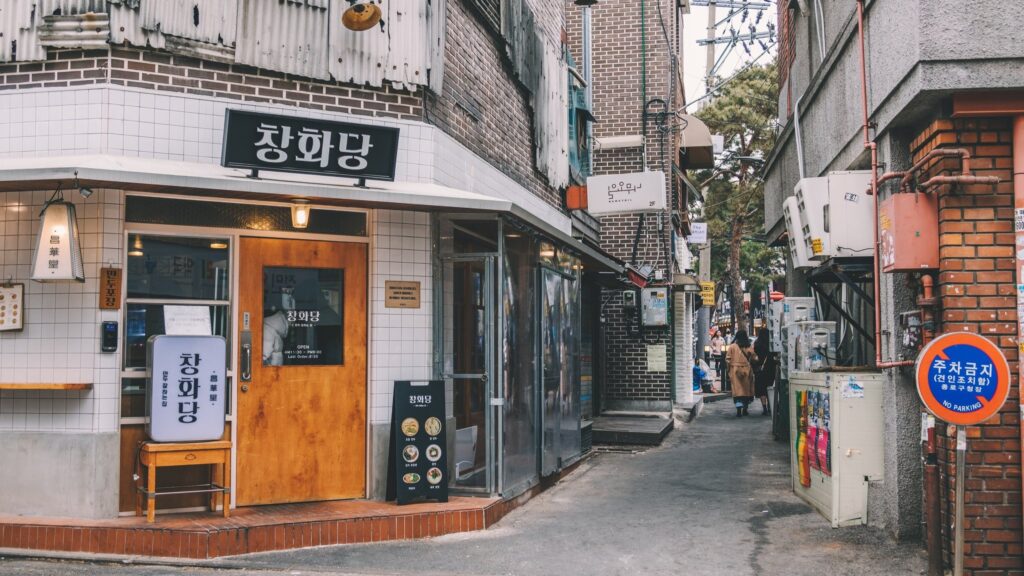
CITY RANKING BY COST (HIGH TO LOW)
- Seoul
Jeju
Busan
Incheon
Gwangju
Daegu
Pohang
Daejeon
Compare your current cost of living to South Korean cities here.
WHAT’S IT LIKE TO LIVE IN SOUTH
KOREA?- Language: Korean
- Currency: Korean Won; (KRW rate here)
- Type of Government: Unitary Semi-presidential Constitutional Republic
- Crime: Low crime rate! Check out the data here.
- Safety Concerns: Traffic accidents, drunk driving
- Public Transportation: Seoul, Busan, Daegu, and other large cities have amazing subway systems. Taxis and buses are relatively cheap!
What’s it like Living in… Seoul
The heart of South Korea, Seoul is the city of endless possibilities. Connected by an extremely efficient subway system, it’s easy to get from one side of the city to the next. Jump from K-Pop shopping districts to the western nightlife area or go from the business district to the red-light district in 30 minutes. A city with a population of almost 10 million, you’ll have to search out your social circle by joining trivia nights, dance classes, or Korean language classes.
Busan
Busan is the “Miami Beach” of South Korea but with less skin. You’ll find yourself hanging out on the sandy beaches of Gwanju or Haeundae where beach bars and sky rise bars are packed every night of the week. You’ll find great fish markets, fresh seafood, and tons of BBQ joints. There are also a plethora of Jimjibangs (spas) in Busan. This city is where old meets- explore old school neighborhoods one minute then step into lavish department stores the next. The only downfall is that Busan gets crowded with tourists during the summer.
Daegu
A tight community of western expats who are very involved in clubs, sports, and activities. Join the Daegu Softball Beer League; participate in open mic nights downtown; become active in the Daegu theatre troop; dance your heart out in the active Korean salsa and hip hop scene, shred the ice with the indoor ice hockey league- the list goes on. It’s very easy to make Korean friends in Daegue in your hobbies or while going out in the small downtown bar scene where everyone knows everyone.
Pohang
A small community of just 500,000, Pohang is an easy city to settle into. Located on the coast, you’ve got a beach to play volleyball on in the summer, a softball league to join in the spring, and temperate weather that won’t make you freeze to death in the winter. You’ll find hiking trails and waterfalls not too far, Busan is just a bus ride away, and local prices are very reasonable. If you’re looking to a laid-back, intimate experience in South Korea, go to Pohang.
Jeju Island
Often called “the Hawaii of South Korea”, it’s easy to see why Jeju island is such an appealing location for teachers. You’ve got gorgeous waterfalls, stunning beaches, and the highest mountain peak in South Korea. The pitfall to living on Jeju is that you are isolated from the rest of the country. There are flights and ferries to the mainland every day, but it’s an effort to get there. If you’re comfortable with living in the smallest province in South Korea and enjoy a slow-paced yet naturally beautiful lifestyle, then go for it!
WHAT’S TO LOVE ABOUT SOUTH KOREA?
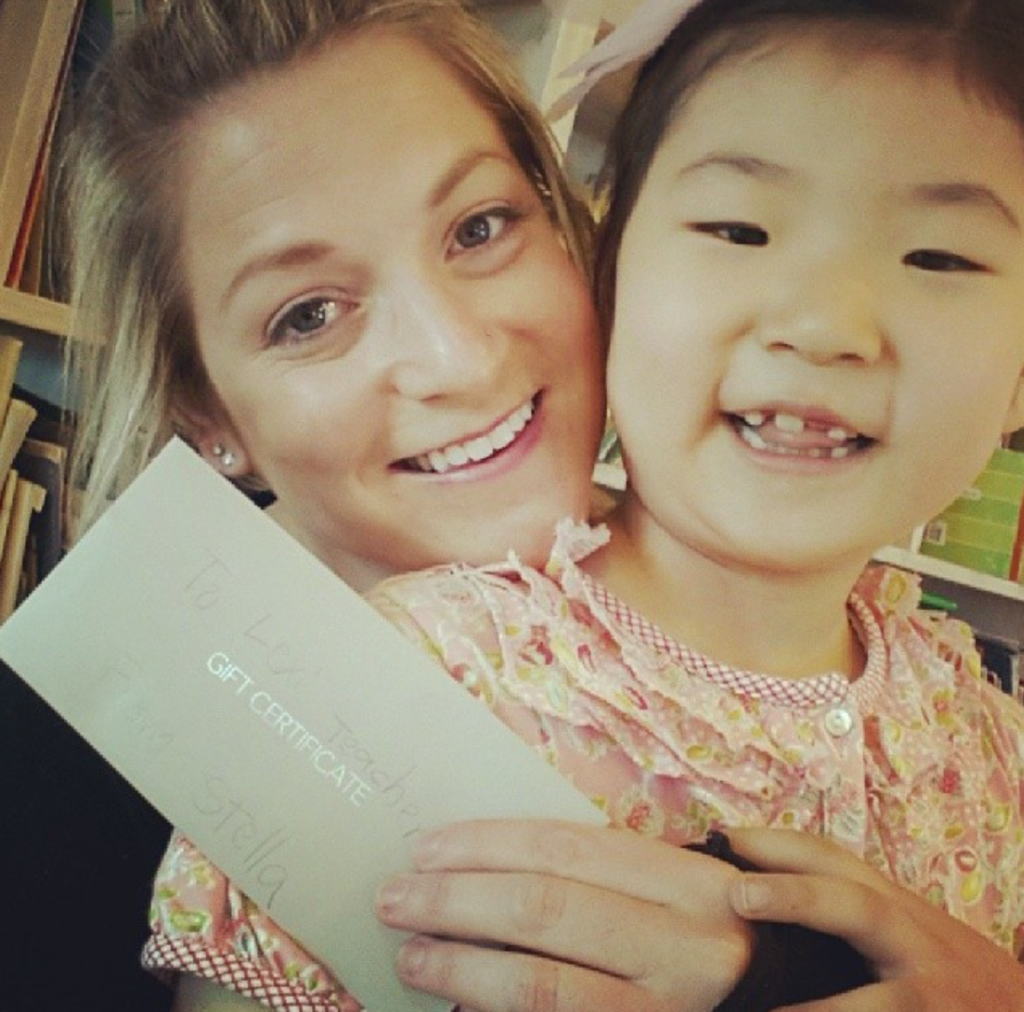
Besides cute kids, free flights and housing, and an adventure that pays you…
Lemme tell you more!
The all-inclusive teacher package is rewarding and generous
Easy to save money and pay off student loans
Korea is extremely safe for foreigners
“Kong-lish” or Korean-English is an easy way to communicate
Strong English teacher community
WHAT’S TO DISLIKE ABOUT LIVING IN SOUTH KOREA?
Schools are seriously hit or miss- some are amazing and some work you to death
Sick days are offered but social pressure discourages you from taking them
The hiring process can feel like a beauty pageant
SOME RESOURCES TO GET YOU EXCITED AND READY TO MOVE TO SOUTH KOREA
Learn to Read Korean in 15 Minutes here
Join the Community of Teachers in Korea on Facebook
IN CONCLUSION: MOVE TO SOUTH KOREA
You won’t regret it. Whether you want a fully-paid adventure, are obsessed with Kpop or have student loans to pay off…South Korea is an amazing place to live, is super safe, and offers you the opportunity to deep dive into a culture that isn’t your own. Go. Just go.
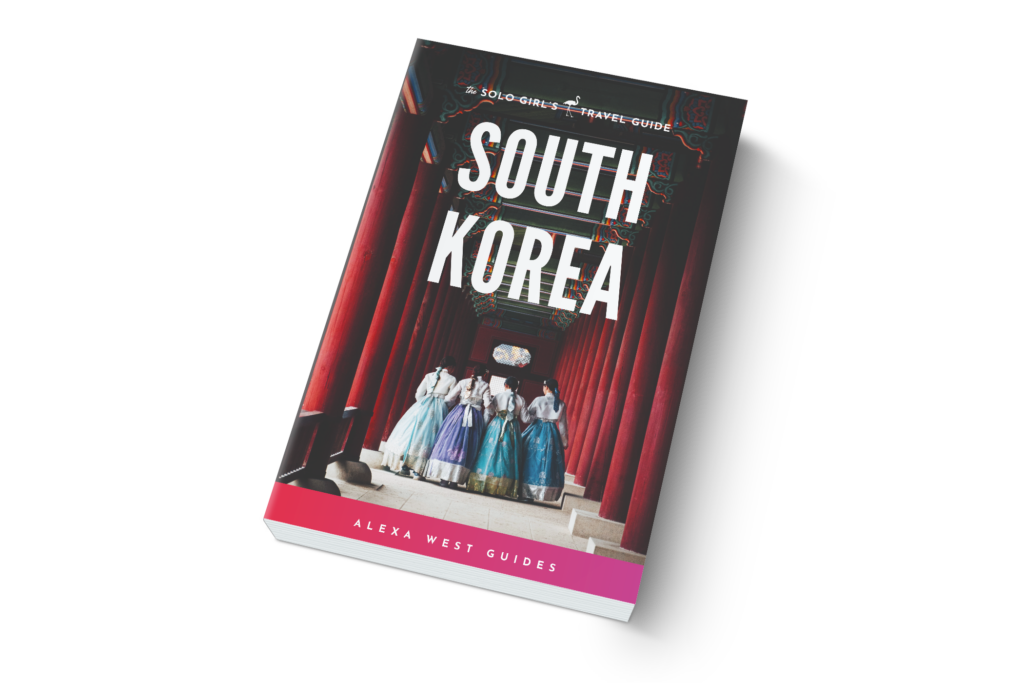
Before you go, make sure you have my guidebook for South Korea. Get it before you go and move to Korea as an expat, not a tourist! And hey, feel free to reach out to me on Instagram @sologirlstravelguide
The
One-Way
Ticket Plan
this book has magic powers
Find and Fund Your Purpose while Traveling the World
Want to contribute to the blog? I love to feature the perspective of other solo female travelers.
Application
Blog Contribution
I'm a bestselling author, hotel reviewer and pickleball player. I teach women how to travel the world solo without going broke or getting kidnapped.
In 2011, I left Seattle with just $200 in my pocket to travel the world solo. Today, I'm the founder and creator of The Solo Girl’s Travel Guide, the #1 travel guide book series for women - and the author of The One-Way Ticket Plan.